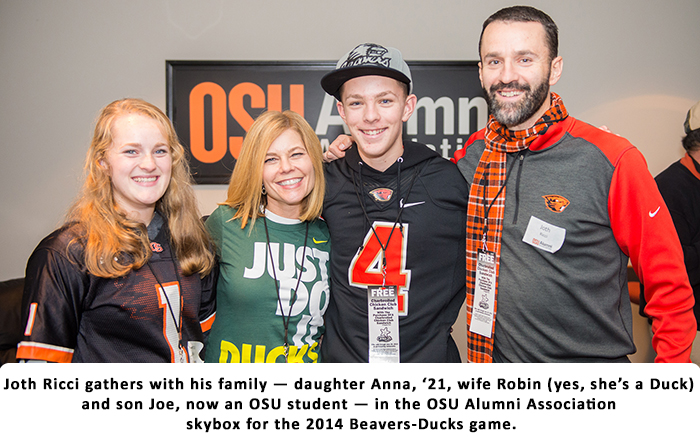From the Winter 2023 issue of the Oregon Stater magazine
All he ever wanted to do was coach and teach.
“I changed my major three times,” said Joth Ricci, the 1991 OSU business education grad and Dutch Bros Coffee CEO who last year led the company to the most successful initial public stock offering (IPO) in Oregon history. Far exceeding projections, it raised nearly half a billion dollars to help fund a push to grow from 600 locations to more than 4,000 within 10 or 15 years.
Ricci grew up in Corvallis. His parents were Beavers, so OSU was a natural choice. He started as a hotel, restaurant and tourism management major “because it sounded fun.” That ended when a manager where he was planning to intern warned him that the work was a grind and he’d hate it. He changed his major to business but soon found himself heading for a D in a crucial business law course.
“So, I switched to business education because by then, I was going to teach at a high school and be a basketball coach,” he said. “For all four years of college, I coached high school basketball. I was on school buses on Friday nights when everybody else was out partying. I was going to gyms with my teams or coaching at camps so I could make money to go to coaching clinics.
“I loved it, all of it. I loved the strategy of basketball, I loved the noise of the gym,” he said. “But mostly it was the part about helping people grow. I loved developing people. I’ve had success leading companies because basketball and teaching are woven into everything I do.”
![]() In 1988, at a Portland coaching clinic, Ricci learned from coaches including Jim Valvano, whose disciplined North Carolina State teams won against seemingly impossible odds; Jerry Tarkanian, the University of Nevada, Las Vegas, legend whose Runnin’ Rebels dominated with speed and stifling defense; and the well-traveled Larry Brown, the only coach ever to win titles at the college and professional levels.
In 1988, at a Portland coaching clinic, Ricci learned from coaches including Jim Valvano, whose disciplined North Carolina State teams won against seemingly impossible odds; Jerry Tarkanian, the University of Nevada, Las Vegas, legend whose Runnin’ Rebels dominated with speed and stifling defense; and the well-traveled Larry Brown, the only coach ever to win titles at the college and professional levels.
Ricci still has detailed, autographed notes from every session.
“I was the 20-year-old kid going up to Valvano and asking him about his full court zone press,” he said. “It changed my life.”
The coaches Ricci most admires — UCLA’s John Wooden is at the top of the list — had distinct systems, emphasizing impeccable character, a strong culture of mutual commitment and meticulous preparation. They tirelessly set up their players for success.
“Wooden is famous for teaching his players how to put on their socks so they wouldn’t get blisters,” Ricci said.
Ricci’s own attention to detail, his eagerness to learn and teach, and a growing sense of how to lead people served him well after graduation. On his way to Dutch Bros, while he never stopped coaching youth basketball, he worked at Johnson & Johnson and Columbia Distributing and led companies including Jones Soda, Stumptown Coffee Roasters and Adelsheim Vineyard. Frequently he was the first non-family member to be the big boss at a family-owned company.
Such was the case at Dutch Bros, founded in 1992 by two brothers, Travis and his late brother Dane Boersma, who started selling espresso drinks from a pushcart in Grants Pass. They quickly realized that people enjoyed cheerful conversation as much as the coffee, and a model was born that lives on in hundreds of Dutch Bros kiosks across the nation.
Ricci joined the company as president in 2019 and began his transition to CEO. The wildly successful IPO in September 2021 put the formerly private Dutch Bros and Ricci in the national media spotlight with stories focused on everything from the impact of rising gas prices on drive-up businesses to his instant opinion on all things Dutch Bros.
Softspoken and quick to smile, Ricci remains unfazed.
“Running a public company is a very different business than running a private company,” he said. “You have to be very open and get ahead of things. You’re never as good as everybody says you are, and you’re never as bad as everybody says you are. I don’t get worked up about that stuff.”
The company’s goal is to grow steadily while preserving the Dutch Bros culture that keeps customers pulling up to their favorite kiosks.
“I don’t care who you are, where you live, what country you’re from, there’s not a person who doesn’t love authentic service,” Ricci said. “Authentic service prevails across every geography, and our job is to connect, engage and grow people, to teach them how to provide it.”
Turnover among the young workers in Dutch Bros booths is about half the industry average. They look like they’re having fun, Ricci said, because they are, but it’s more than just cheerful banter and knowing what goes into a Caramel Pumpkin Brûlée Breve (espresso, pumpkin and salted caramel with soft top, pumpkin drizzle and raw sugar) or an Annihilator (extra espresso with half and half and chocolate macadamia nut syrup).
Like assistant coaches being brought up in a successful basketball program, managers at Dutch Bros are taught to master the details, build cohesiveness and nurture pride of performance in their teams.
“We promote from within,” Ricci said. “Everybody who’s running a Dutch Bros has worked at a Dutch Bros for five to seven years. And we remind our people that in many cases, the best part of somebody’s day was when they visited a Dutch Bros.”
Ricci recently published a handbook that’s a master class on his management philosophy, “The System: Powers of Five.” Full of guided learning experiences and inspirational content, it’s not readily available in stores. (Learn more about it at thesystem.co.)
A former chair of the OSU Alumni Association Board of Directors, Ricci remains loyal to his alma mater and is especially fond of retired longtime alumni director Don Wirth, ’61, and his wife Shirley, ’63, who have been friends since his days roaming the campus as a kid.
He serves as chairman of the Oregon Business Commission and uses his increasing clout to encourage established, mostly male and white-owned Portland businesses to partner with minority- and women-run nonprofits to fight homelessness and hunger.
Beaverton is home, although he’s a frequent visitor to Grants Pass and to Corvallis, where his son Joe and daughter Anna are students at Oregon State. They both study business, she as a grad student, and it’s quite possible that customers at a Corvallis campus Dutch Bros might get served by the CEO’s daughter.
Ricci realizes that from the outside, his rise with Dutch Bros might make him look like the classic corporate climber.
“That’s just not me,” he said. “At first, I wasn’t going to take the job.”
But then an old friend challenged him to think of it from a coach’s perspective, to consider the many thousands of young people — Dutch Bros calls them “broistas” — who have their first work experience in a Dutch Bros, and of the way such an experience can shape a life.
“He told me, ‘The impact that you will have on those thousands of young people could be the greatest body of work that you’ll have.’ That’s what did it,” Ricci said.
“The skillsets they’re learning through all those interactions are irreplaceable. If we can be great with how we hire and teach and develop people, think of the difference that we can make in those people’s lives as they go on.”
In 1988, at a Portland coaching clinic, Ricci learned from coaches including Jim Valvano, whose disciplined North Carolina State teams won against seemingly impossible odds; Jerry Tarkanian, the University of Nevada, Las Vegas, legend whose Runnin’ Rebels dominated with speed and stifling defense; and the well-traveled Larry Brown, the only coach ever to win titles at the college and professional levels.


